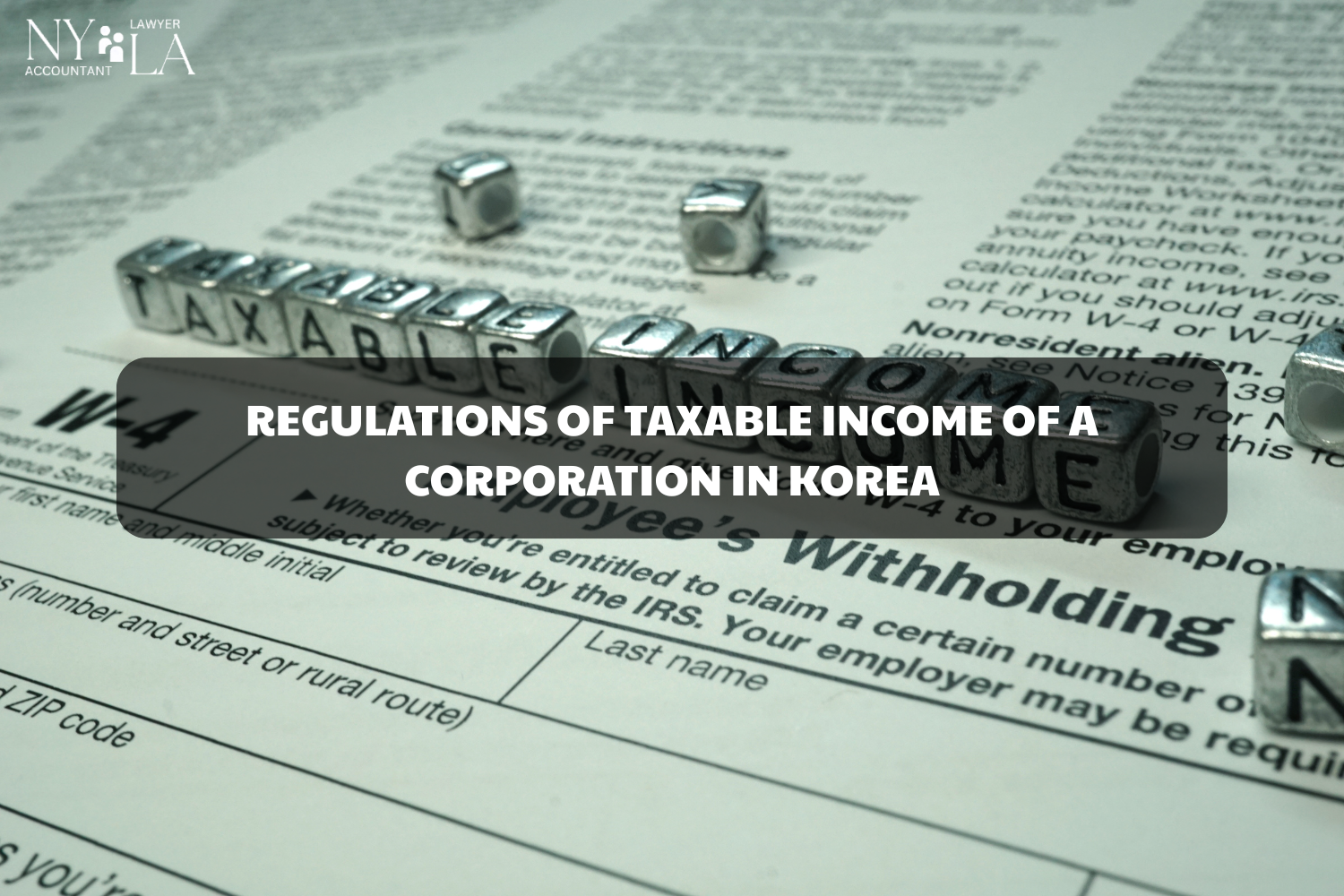Corporate tax Korea regulations are essential for any business operating in the country—whether domestic or foreign, profit or non-profit. Governed by the Corporate Tax Act, these rules define what qualifies as taxable income for various types of corporations. In this guide, we break down the main categories of taxable income and explain how corporate tax in Korea is applied in practice.
Summary
- 1. What Is Corporate Tax in Korea?
- 2. Corporate Tax Korea: Income of Domestic Corporations
- 3. Corporate Tax Korea: Taxable Income of Non-Profit Domestic Corporations
- 4. Corporate Tax Korea: Income of Foreign Corporations
- 5. Corporate Tax Korea: Taxation of Non-Profit Foreign Corporations
- 6. Legal Foundation of Corporate Tax in Korea
- 7. Why Understanding Corporate Tax in Korea Matters
- 8. Corporate Tax Korea: Tips for Compliance
- 9. Corporate Tax Korea and International Corporations
- 10. Final Thoughts: Navigating Corporate Tax in Korea
- 11. About NYLA – Korean Legal Office
1. What Is Corporate Tax in Korea?
Corporate tax in Korea is a tax imposed on the income of corporations operating within the country. Whether you’re a domestic or foreign business, profit or non-profit organization, understanding the scope of taxable income is essential for legal compliance and effective tax planning. The Corporate Tax Act is the legal foundation that governs how corporate tax is assessed in Korea.
2. Corporate Tax Korea: Income of Domestic Corporations
For domestic corporations, corporate tax in Korea applies to several categories of income. These include:
-
Income earned in each business year: This is the primary source of taxation, covering all regular earnings from business operations.
-
Liquidation income: If a corporation dissolves, any income generated from the liquidation of assets is taxable.
-
Capital gains from asset transfers: Especially from the sale of land or other significant properties, such gains are subject to corporate tax in Korea.
This approach ensures that the Korean tax authority captures all forms of revenue that contribute to a corporation’s wealth.

3. Corporate Tax Korea: Taxable Income of Non-Profit Domestic Corporations
While non-profit domestic corporations are generally not structured to generate profit, corporate tax in Korea still applies if these entities engage in income-generating activities. Here’s what is taxable:
-
Commercial activities: Engaging in industries like manufacturing, retail, construction, or business services leads to taxable income.
-
Interest income: This includes interest from deposits (both domestic and overseas), as well as discounted values of bonds or securities issued by various entities.
-
Dividend income: Any dividends or similar profit distributions from investments are considered taxable.
-
Stock and investment transfers: Gains from the sale of stocks or investment rights are subject to tax.
-
Fixed asset disposal: Income from selling or transferring long-term assets is also taxable.
-
Other ongoing income: Any income from continuous operations, even within a non-profit framework, may fall under Korea’s corporate tax regulations.
In short, corporate tax in Korea doesn’t automatically exempt non-profit corporations—if they earn income similar to a business, that income is taxed.
4. Corporate Tax Korea: Income of Foreign Corporations
Foreign corporations with operations or income sources in Korea are also subject to corporate tax in Korea. The taxable income includes:
-
Income from domestic sources: Any revenue earned within Korea’s borders during a business year is taxable.
-
Capital gains: Especially from the transfer or sale of land and other Korean assets.
This reflects Korea’s source-based taxation system, where income generated within the country is taxed regardless of where the corporate entity is based.
5. Corporate Tax Korea: Taxation of Non-Profit Foreign Corporations
Non-profit foreign corporations are only partially exempt from corporate tax in Korea. Taxation applies if the entity earns revenue from profit-making activities within Korea. This includes:
-
Commercial services offered in Korea
-
Revenue from local investments
-
Income from property sales or leases in Korea
Essentially, if a non-profit foreign corporation operates in a way that competes with profit-making businesses, it is treated similarly for tax purposes under Korean law.
6. Legal Foundation of Corporate Tax in Korea
The primary legal document that governs corporate tax Korea is the Corporate Tax Act, which outlines tax obligations based on income type, corporate status, and whether the entity is domestic or foreign. Understanding this law is essential for legal compliance and financial planning for any business operating in Korea.
7. Why Understanding Corporate Tax in Korea Matters
Whether you’re establishing a new corporation or managing an existing business, having a clear grasp of corporate tax in Korea can prevent legal issues and unnecessary tax liabilities. Common challenges faced by businesses include:
-
Misclassifying taxable vs. non-taxable income
-
Overlooking capital gains or liquidation income
-
Underreporting foreign-sourced income earned domestically
-
Assuming non-profit status equals tax exemption
By staying informed and working with experienced tax advisors, corporations can navigate the Korean tax system efficiently.
8. Corporate Tax Korea: Tips for Compliance
Here are some practical tips for corporations—both domestic and foreign—operating in Korea:
-
Keep detailed financial records: Proper documentation helps verify income sources.
-
Understand the tax year: Most Korean businesses follow a January–December fiscal year, but this can vary.
-
Monitor all sources of income: Especially those from land transfers, investment gains, or overseas earnings.
-
Consult with experts: Navigating corporate tax in Korea can be complex. Local legal or accounting firms specializing in Korean tax law can be invaluable.
9. Corporate Tax Korea and International Corporations
If your foreign corporation is planning to expand into Korea, understanding corporate tax Korea regulations is essential before setting up operations. Korea’s corporate tax system is structured to ensure fairness and proper contribution from both local and international business entities.
Korea’s tax regime is also influenced by double taxation treaties with other countries, which may affect how much tax you pay in Korea versus your home country.
Corporate tax Korea regulations may appear complex, but a structured understanding helps businesses remain compliant and efficient. Whether you’re a domestic corporation, a foreign investor, or a non-profit organization, it’s important to know:
-
What income is taxable
-
How to categorize it
-
Which rules apply to your corporate status
By mastering these fundamentals, you can not only meet legal obligations but also plan your business strategies more effectively in one of Asia’s most dynamic economies.
11. About NYLA – Korean Legal Office

■ NYLA – Your Trusted Legal Partner in Korea
At NYLA, we understand that the success of foreign businesses in Korea requires not only a solid business strategy but also reliable legal support. With a team of experienced Korean attorneys and legal professionals, NYLA provides tailored legal services for companies, investors, and individuals operating or planning to establish a presence in Korea.
We support our clients throughout the entire business journey with comprehensive services, including:
- Legal consultation on company establishment, taxation, and immigration;
- Advice on commercial real estate, franchising, and product distribution;
- Support in human resources, marketing, and business strategy.
In addition to legal advisory, NYLA also represents clients in civil litigation cases related to business, labor, marriage, family, and inheritance to ensure their rights and interests are fully protected.
■ Contact NYLA

If you’re a foreign business or individual looking for a reliable legal partner in Korea, NYLA is here to help. We are committed to delivering effective, practical, and personalized legal solutions for every client.
With a proven track record of assisting hundreds of international clients, our team is equipped to help you navigate complex legal challenges—whether it’s commercial disputes, contract issues, or foreign investment guidance.
Don’t let legal matters hold you back. Let NYLA be your trusted guide in the Korean market.
■ Get in touch with NYLA for expert legal support
| Website: https://nylakoreanlegal.com/
FB: https://www.facebook.com/nyla.koreanlegal Tiktok: https://www.tiktok.com/@nylakoreanlegal Youtube: https://www.youtube.com/@NYLA-xd8qx Email: info.NYLAkoreanlegal@gmail.com SĐT: +82 10-3415-7859 |
 |






















































